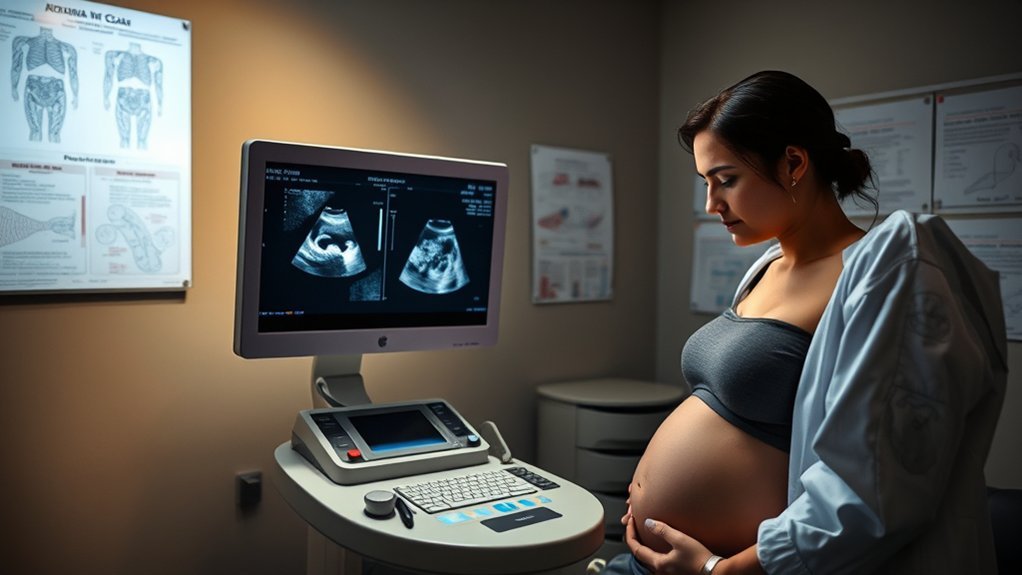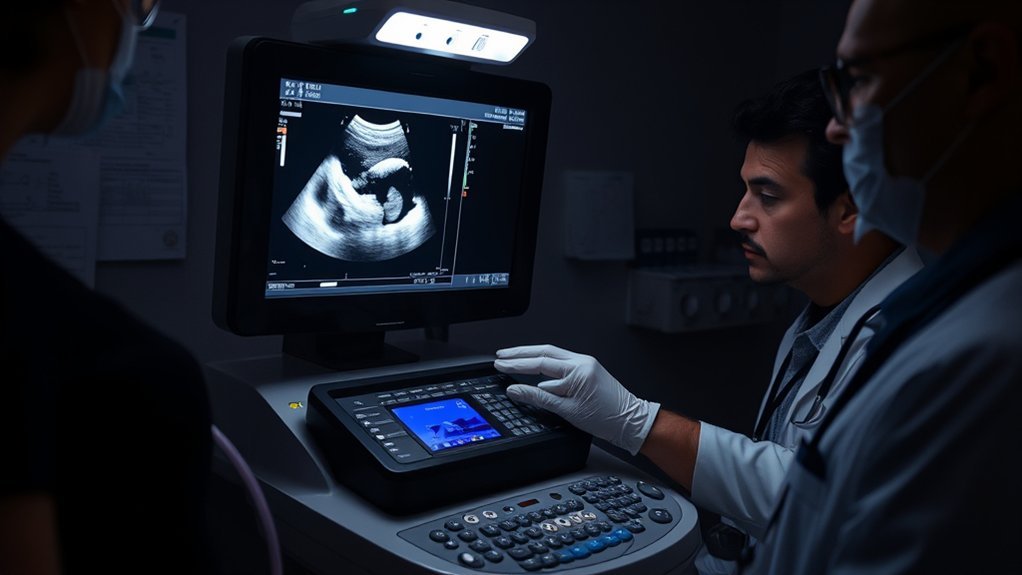Did you know that nearly 20% of pregnancies in the U.S. are considered high-risk due to various factors? Understanding the anatomy scan is essential, as it can reveal crucial information about fetal development and potential complications. Factors like maternal age, pre-existing health conditions, and lifestyle choices can prominently influence outcomes. What do these elements mean for your pregnancy journey? Let’s explore how they interplay during this critical scan.
Understanding the Anatomy Scan Process

When you undergo an anatomy scan, also known as a mid-pregnancy ultrasound, you’re participating in an essential step of prenatal care that provides crucial insights into your baby’s development.
This scan typically occurs between 18 and 22 weeks of pregnancy and allows your healthcare provider to assess your baby’s growth, anatomy, and overall health.
During the procedure, a trained technician applies a gel to your abdomen and uses a transducer to capture images of your baby. You’ll likely see the baby’s organs, limbs, and heart, and they may check for any structural abnormalities.
This detailed examination helps identify potential issues early, enabling timely interventions or further testing if necessary. Understanding this process empowers you to engage actively in your prenatal care.
Maternal Age and Its Impact on Fetal Development

The anatomy scan not only reveals important information about your baby’s growth but also highlights how maternal factors, such as age, can influence fetal development.
The anatomy scan provides vital insights into your baby’s growth and how maternal age affects fetal development.
As you age, the risk of chromosomal abnormalities, like Down syndrome, increases. Women over 35 are often categorized as “advanced maternal age,” which can lead to closer monitoring during pregnancy.
Older mothers may also experience higher rates of complications, such as gestational diabetes and hypertension, which can affect fetal health.
Additionally, the quality of eggs declines with age, potentially impacting fertility and embryo viability.
It’s crucial to discuss these factors with your healthcare provider to understand how your age may influence your pregnancy and to guarantee you’re receiving appropriate care throughout this critical period.
Pre-Existing Health Conditions and Complications

Pre-existing health conditions can considerably impact both pregnancy and fetal development, making it essential to address them early in your prenatal care. Conditions like diabetes, hypertension, and autoimmune disorders can increase the risk of complications such as preterm birth, low birth weight, and developmental issues.
It’s vital to manage these conditions proactively through regular monitoring and appropriate medication adjustments. For instance, if you have diabetes, controlling your blood sugar levels can greatly reduce risks for you and your baby.
Additionally, informing your healthcare provider about any chronic conditions allows for tailored care plans, ensuring both your health and your baby’s well-being are prioritized. Open communication and consistent follow-ups are key to steering through pregnancy with pre-existing health conditions.
Lifestyle Choices and Their Effects on Pregnancy
Making informed lifestyle choices during pregnancy can greatly influence both your health and your baby’s development.
Prioritizing a balanced diet rich in fruits, vegetables, whole grains, and lean proteins guarantees you receive essential nutrients. Staying hydrated is equally important, as it supports amniotic fluid levels and helps reduce swelling.
Regular exercise, tailored to your fitness level, can enhance mood, reduce stress, and promote overall well-being. Avoiding tobacco, alcohol, and recreational drugs is vital, as these substances can lead to serious complications.
Additionally, managing stress through mindfulness or relaxation techniques can foster a healthy environment for your growing baby.
Genetic Factors and Family History Considerations
Genetic factors and family history play an essential role in pregnancy outcomes and the health of your baby. Understanding these aspects can help you make informed decisions and prepare for potential challenges. Family history of genetic disorders may increase the risk of certain conditions in your child. It’s vital to discuss these factors with your healthcare provider, who may recommend genetic counseling or testing.
| Genetic Factor | Family History Consideration |
|---|---|
| Chromosomal Abnormalities | Siblings with genetic conditions |
| Single Gene Disorders | Parents with hereditary diseases |
| Multifactorial Disorders | Family history of complex traits |
| Carrier Status | Ethnic background and genetic risks |
| Age-related Risks | Older parents and associated risks |
Frequently Asked Questions
How Accurate Are Anatomy Scans in Detecting Fetal Abnormalities?
Anatomy scans are highly accurate, detecting up to 80-90% of major fetal abnormalities. However, no test is perfect, so it’s important to combine results with additional screenings and consultations for thorough prenatal care.
What Is the Typical Duration of an Anatomy Scan Appointment?
An anatomy scan appointment typically lasts between 30 to 60 minutes. During this time, you’ll undergo imaging to assess fetal development, while the technician will guarantee detailed measurements and observations are thoroughly documented for your records.
Can I Bring Someone With Me to the Anatomy Scan?
Absolutely, you can bring someone with you to the anatomy scan. It’s like sharing a momentous occasion—a first glimpse of your baby. Having support can enhance the experience, making it even more memorable and meaningful.
Are There Any Special Preparations Needed Before the Anatomy Scan?
Yes, you should drink plenty of water before your anatomy scan. It helps improve image quality. Wear comfortable clothing and arrive a bit early to complete any necessary paperwork. Avoid any heavy meals prior to the appointment.
What Happens if Abnormalities Are Detected During the Anatomy Scan?
If abnormalities are detected during the anatomy scan, your doctor will discuss the findings with you, recommend further testing or referrals, and help you understand potential implications for your pregnancy and the baby’s health.
Conclusion
In summary, the anatomy scan is an essential tool for monitoring your baby’s development and identifying potential issues early on. Remember, “an ounce of prevention is worth a pound of cure.” By understanding the impact of maternal age, pre-existing health conditions, lifestyle choices, and genetic factors, you can take proactive steps to guarantee a healthy pregnancy. Regular prenatal care and open communication with your healthcare provider are crucial for achieving the best outcomes for both you and your baby.
